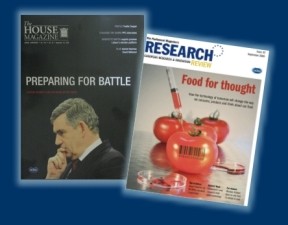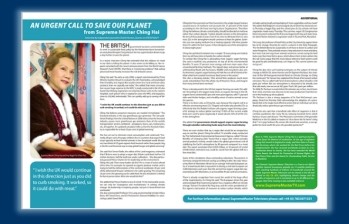|
AN URGENT CALL
TO SAVE OUR PLANET
from Supreme Master Ching Hai
|
Interview by independent journalist
Charlie Norton
|
| Supreme Master
Ching Hai wearing Veggie Fur (Faux Fur) |
THE BRITISH government
has been commended for its
work in sustainable food policy by the Vietnamese-born humanitarian
and philanthropist Ching Hai but she has urged Gordon Brown
to go a step further to save the planet.
In a recent interview, Ching
Hai reiterated that the reliance on meat in our diets is killing
the planet. It also seems to be killing us. Her request coincided
with the recent announcement from the World Cancer Research
Fund (WCRF), that there is “convincing evidence”
that eating processed meat heavily increases the risk of bowel
cancer.
Ching Hai said, “As
early as July 2008, a report commissioned by Prime Minister
Gordon Brown to evaluate the UK’s food policy, acknowledged
that “a healthy, low-impact diet would contain less
meat and fewer dairy products than we typically eat today.”
She added that meat consumption causes a huge expense to the
NHS. “A study conducted in the UK also found that lifelong
vegetarians not only have fewer visits to the nation’s
hospitals, each person who is vegetarian saves the NHS, and
taxpayers, close to £50,000, individually. This can add
up quickly to savings of billions.
“I wish the UK would
continue in this direction just as you did to curb smoking.
It worked, so it could do with meat.”
Ching Hai believes that proactive
measures are needed immediately. “The livestock industry
is the top greenhouse gas generator. The last published findings
from the United Nations in 2006 told us that the livestock
industry causes more greenhouse gas emissions than all the
world’s transportation sectors combined—aeroplanes,
trains, cars, motorcycles, etc., all together. An updated
calculation tells us that the livestock industry is responsible
for at least 50 per cent of global warming.”
She has set out to eliminate
meat consumption and continued, “Currently, 80 per cent
of hungry children live in countries that export food crops
typically to feed farmed animals in the developed world. Moreover,
two-thirds of US grain exports feed livestock rather than
people. Veg is the first and foremost way to stop global hunger
and global warming.”
She said that Simon Fairlie,
the editor of the Land magazine, estimated that if
Britons were to adopt a vegan diet, Britain could feed itself
on 3.0 million hectares, half the land now under cultivation.
She also particularly praised Prince Charles for his leadership
on the environment. Ching Hai said, “How many leaders
do this? He is a man of action ahead of his time. For example,
he opened an organic produce market, and is trying to halt
the deforestation of the rainforest worldwide. A full 80 per
cent of the deforested Amazon rainforest is used for cattle
grazing. The remaining 20 per cent is used for growing soy
for cattle feed. He also donated £1.5 billion for forest
preservation. Who else would do this?”
She added that Prince Charles
is one of a kind. “In his memorable words, we can only
be “courageous and revolutionary” in solving climate
change. His leadership is inspiring people, not just in Great
Britain but worldwide.”
She also commended Professor
Tim Lang, Environmental Minister Hilary Benn, MP David Drew,
and EU Parliament’s Edward McMillan for advocating a
plant-based diet.
Ching Hai then pointed out
that livestock is the single largest human-caused source of
methane and accounts for 37 percent of the total, according
to the UN Food and Agriculture Organization. Therefore, Ching
Hai believes that the climate control policy should be directed
at methane rather than carbon dioxide. “Carbon dioxide
remains in the atmosphere for tens of thousands of years.
Even if we were to eliminate it to zero now, CO2 in the atmosphere
would continue to heat the planet. Scientists are now saying
that methane has a heating capacity 100 times greater than
CO2 within the first 5 years. It then dissipates out of the
atmosphere in about eight years.”
Ching Hai said that the bottom
line is simple. “If meat eating were halted, then we
still have time to handle the carbon dioxide.”
To combat this, Ching Hai
is advocating more organic vegan farming. She said that it
could be very productive on top of all the environmental benefits.
“It saves 37 percent more energy, and even more water,
than conventional farming methods. The topsoil stays and proves
better at withstanding floods and hurricanes. Wildlife and
ecosystems also win. Furthermore, organic vegan farming will
halt the runoff of chemical fertilizers that have created
monstrous dead zones in the ocean.” She cites a shocking
statistic. “One animal farm produces much more waste
and pollution than the whole city of Houston, Texas, and imagine
how many animal farms we have.”
There is already proof in
the UK that organic farming can work. She added, “According
to the largest study done on organic farming in the UK, organic
farms contained 85 per cent more plant species, with 71 percent
taller and thicker hedges, and a healthy return of native
animals across the species.
There is no down side, as
Ching Hai says, because the organic soil is so effective at
removing more CO2. “Organic soil matter also absorbs
CO2 so effectively that the Rodale Institute calls organic
vegan farming a powerful strategy to reduce global warming.”
If 60% of the current arable land were used to grow organically,
it would absorb 50% of all the CO2 in the atmosphere.
She added that governments
should support organic vegan farming through subsidies, redirecting
funds away from the meat industry.
There are even studies that
say a vegan diet would be an inexpensive way to cool the planet.
Ching Hai added, “A scientific study conducted by The
Netherlands Environmental Assessment Agency, called “Climate
Benefits of Changing Diet,” found that a vegan diet,
which excludes animal products entirely, would reduce the
global government cost of stabilizing the Earth’s atmosphere
by 80 percent compared to a meat diet.” The report concluded
that US$20 trillion, or 50 percent of a total US$40 trillion
estimated cost, could be saved from the global shift to a
low-meat diet.
Some of the calculations
show outstanding reductions. “Researchers in Germany
compared emission savings according to diet,” she said,
“measuring them in kilometers driven by an average,
mid-sized European car. So, if a meat-based diet is equivalent
to driving a mid-size European car 5,000 kilometers each year,
then the animal-free organic vegan diet represents just 281
kilometers, or an incredible 94 per cent less emissions.
There is already recognition
from round the world of the huge, harmful effects of the meat
industry. As Ching Hai said, “The European Union this
year acknowledged that meat consumption has a negative effect
on climate change. Taiwan’s President Ma Ying-Jeou and
the entire presidential office signed a declaration of measures
to reduce carbon dioxide, which includes eating locally and
partaking of more vegetables and less meat.” She added
that Belgium’s second largest city of Ghent has declared
every Thursday a Veggie Day, and this school year, all city
schools will have vegetarian meals every Thursday. This summer,
vegan US Congressman Dennis Kucinich endorsed the first-ever
Vegan Earth Day and state Senator Jamie Raskin initiated a
vegetarian week in Tacoma Park, Maryland.
Tim Lang, the professor of
Food Policy at the City University, agrees there has to be
change. Recently, he said in a column in the Daily Telegraph,
“For the British diet to be sustainable, it will have
to lower its carbon and water footprints. That probably means
a big reduction in meat and dairy, but more fruit and veg;
fewer animals reared on cereals (using the land twice over)
but more fed on grass, which allows them to lock carbon into
the soil. Some argue that this more labour-intensive
food system could be good for jobs and biodiversity. Let’s
hope so. The current system cannot go on.”
Ching Hai also cites such
leading luminaries on the subject of climate change as NASA’s
Dr. James Hansen and Dr. Rajendra Pachauri, the chairman of
the UN Intergovernmental Panel on Climate Change. As Ching
Hai continued, “Dr. Hansen has explained the threat
of increased carbon emissions. The so-called ‘safe’
level of atmospheric carbon dioxide is 350 parts per million.
But our atmosphere is measured to be already over that safe
mark; now we are at 385 ppm.” That’s 385 parts
per million!
“In 2008, Dr. Pachauri
revealed that UN estimates are, in fact, much lower than what
scientists now discover to be meat production’s harmful
terror in the heating up of our planet.”
“Dr. Pachauri is also
a strong supporter of Sir Paul McCartney’s campaign,
Meat Free Monday. Both acknowledge that the adoption of a
plant-based diet is the single most effective action that
an individual can do to drastically reduce greenhouse gas
emissions.”
Ching Hai also said that
a beneficial side effect of veganism is that it combats pandemics
like swine flu by reducing livestock farms which harbour viruses
and disease. “The Physicians Committee of Responsible
Medicine in the US called on leaders to “shut down the
flu farms” citing that “1 in 3 pigs harbours flu
viruses. We should ask ourselves, ‘Is
our appetite for meat worth the price of a possible pandemic?’”
|

 The
UK-based Parliament Magazine’s “Research Review”
September, Golden Year 6 (2009) edition published an interview with
Supreme Master Ching Hai by journalist Charlie Norton which originally
appeared in the September 18 issue of The House Magazine. The
House Magazine is a prestigious, impartial, political publication
that is mostly read weekly by Members of Parliament, of both Houses,
and within the Palace of Westminster. The interview took place via
videoconference and covered a broad range of topics, from the current
critical state of global warming, the harmful impact of methane, and
the melting of the Arctic permafrost to organic farming and the detrimental
planetary consequences of raising livestock for human consumption.
The
UK-based Parliament Magazine’s “Research Review”
September, Golden Year 6 (2009) edition published an interview with
Supreme Master Ching Hai by journalist Charlie Norton which originally
appeared in the September 18 issue of The House Magazine. The
House Magazine is a prestigious, impartial, political publication
that is mostly read weekly by Members of Parliament, of both Houses,
and within the Palace of Westminster. The interview took place via
videoconference and covered a broad range of topics, from the current
critical state of global warming, the harmful impact of methane, and
the melting of the Arctic permafrost to organic farming and the detrimental
planetary consequences of raising livestock for human consumption.
